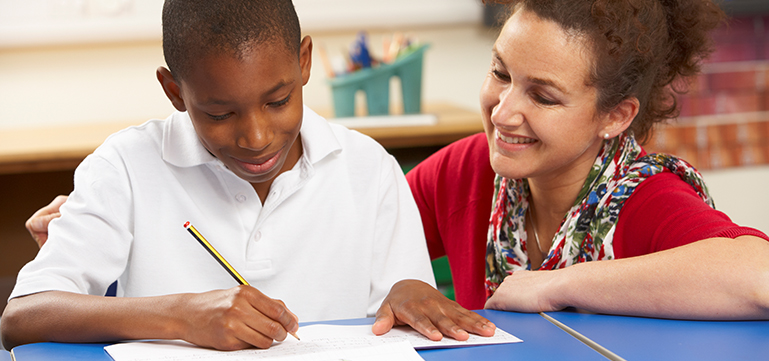A school environment that benefits pupil wellbeing

Quick links:
Information about the school
Ysgol Llandrillo Yn Rhos is in the seaside town of Rhos on Sea, in the county of Conwy. There are currently 414 full-time and 60 part-time pupils on roll between the ages of three and eleven. Most pupils come from the immediate area. Nearly all of its pupils come from English speaking backgrounds. Currently, 16% pupils have additional learning needs and approximately 16% are eligible for free school meals.
There are 15 full time and five part-time teachers at the school, with 16 full-time and nine part-time support staff. The school also has a full time Family Liaison Officer, a social, emotional and behavioural (SEB) manager and a Forest School Leader.
Context and background to sector-leading practice
The school’s motto is ‘Together Everyone Achieves More’ and it endeavours to promote this successfully within all aspects of school life.
The school has developed an ethos of care, inclusiveness and mutual respect. The environment is warm and inviting and includes an art studio, a community-learning hub and a Forest School outdoor classroom. The school financed the Forest School outdoor classroom through a grant from the Wind Farm. It includes a fire-pit, seating area, bug hotel and pond area. By using it effectively, pupils benefit from learning about their environment and important life skills in the outdoors. The area accommodates both Foundation Phase and key stage 2 pupils. Pupils’ work is on display around the school and is of a high quality. The school has a designated art shed and specialist art teacher who plans and delivers lessons linked to the class topic as an integral part of the curriculum. This teacher currently leads on the ‘lead creative school’ initiative. Many pupils at key stage 2 thoroughly enjoy weekly art sessions. The school considers that the quality of the art produced by the pupils is of a very high standard. The school states that it promotes and supports the use of information and communication technology (ICT) effectively at both Foundation Phase and key stage 2 both within the school and across the local authority.
Description of nature of strategy or activity
During the last three years, the school has aimed to improve pupils’ wellbeing and standards of attainment. It has done this by endeavouring to improve parents’ involvement with the school. It has developed a range of initiatives in collaboration with pupils, parents, feeder high schools and the community. Members of staff lead initiatives to develop pupils’ wellbeing, by working at various levels within the school. Staff use the school learning environment as part of a rolling programme and timetable it to enable all pupils to develop problem solving, thinking and social skills outdoors. The school’s higher level teaching assistants plan and deliver its forest school and social skills provision, and the class teacher supports the development of pupils’ problem solving skills.
The school has a community hub with a full time family liaison officer who provides a wide range of support programmes. These enhance the wellbeing of all pupils significantly. These programmes include:
• Fast Forward (transition programme)
• Boost (confidence building)
• Together Time (parent and child sessions in the Foundation Phase)
• Animate Learning (parent and child sessions at key stage 2)
• Learning Together Weeks’
• Nurture groups
• Areas of responsibility for pupils
• Debating groups
• Target setting meetings for every individual (assertive mentoring for pupils in Years 1 to 6)
• Developing the outside areas
Many pupils have significant responsibilities, which they undertake in a mature manner. These include green rangers, art ninjas, Digi-wizards and members of the school council. All of these groups make a valuable contribution to the school and school life. Members of the school council are highly effective and consistently promote the wellbeing of the pupils within the school. Digi-wizards support the development of ICT across the school and during training sessions for teachers and staff from other schools. The school states that pupils’ standards in using ICT are exemplary.
Each pupil from Year 1 to Year 6 has the opportunity to meet every term on a 1:1 basis with their class teacher, to set and review their targets in numeracy and literacy. Pupils know their next steps of learning and are highly motivated to achieve their own goals.
The outside learning environment and development of social skills actively promote the development of many skills, including numeracy and literacy, and impact positively on children’s attainment and achievement. The environment is stimulating and inviting, and one in which pupils feel happy and safe to learn.
What impact has this work had on provision and learners’ standards?
The school states that:
• Pupils and parents have reported increased confidence during transition from pre-school to Nursery, Year 2 to Year 3, and Year 6 to Year 7
• The school feels that the way parents engage with it is excellent, with 96% of parents attending the school’s Learning Together Weeks, when parents and pupils work together in class
• All pupils accessing the nurture provision have made very good improvements in their social and emotional skills
• All pupils at key stage 2 also make progress in national assessments, while 80% of pupils achieved Personal and Social Development Outcome 6 at the end of the Foundation Phase
• Parents of pupils receiving nurture provision are more effectively involved in their child’s learning and are more positive about their own parenting capacity
• Teachers across key stage 2 and the Foundation Phase report that pupils’ behaviour has improved and they engage better during all lessons
How have you shared your good practice?
The school has supported many schools in all aspects of wellbeing. It has shared its success through headteachers’ meetings, consortia meetings, ICT training and training events.
The school welcomes visits from other schools looking to develop their own settings and supports the implementation of initiatives through its role as a Pioneer/Co-leading school.